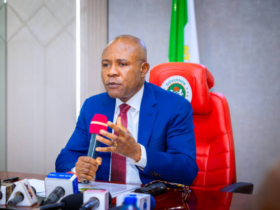Nigerians affected by the rising cost of living borrowed a staggering N3.82tn from banks as of January 2024, according to the Central Bank of Nigeria (CBN). The latest monthly economic report posted on the CBN website shows that total consumer credit surged by 11.9% in January 2024, mainly due to an increase in personal loans amid soaring inflation.

Year-on-year, consumer credit jumped by N1.41tn from N2.41tn in January 2023. Personal loans saw a 14.3% increase to N3.028tn from N2.648tn in December 2023, while retail loans rose by 3.6% to N794.79bn. Personal loans accounted for 79.2% of the total consumer credit, highlighting Nigerians’ struggle with persistent inflation and dwindling purchasing power.
The report read, “Total consumer credit outstanding increased by 11.9% to N3.82tn in January 2024, driven, mainly, by the rise in personal loans on the back of heightened inflation.” It further noted that consumer credit, as a share of total credit from other depository corporations (ODCs), declined to 6.6% from 7.7% in the previous month.
Total credit extended to key sectors of the economy also increased significantly. The CBN reported a 29.7% rise to N57.76bn in January 2024 from N44.54bn in December 2023. This growth was mainly driven by increased credit to services (25.6%), industry (37.5%), and agriculture (7.1%). The services sector received the most credit, accounting for 52.1%, followed by industry at 44.7%, and agriculture at 3.2%.
Inflation reached a 28-year high of 33.95% in May, prompting the CBN to hike interest rates to 26.25%. Nigerians are grappling with worsening living conditions and economic hardships following significant economic reforms by the current administration. The country is experiencing its worst economic crisis in decades, with rampant inflation, a plummeting currency, and millions struggling to afford basic necessities.
Many Nigerians are turning to loans to meet their daily needs. A study by SBM Intelligence found that 27% of Nigerians across various income levels now rely on loan apps to cope with living expenses amidst record inflation. This surge in loan app usage indicates the severe impact of inflation on Nigerians, particularly those with limited financial resources.
In the informal sector, people are increasingly using loan apps, while civil servants seek financial assistance from their employers. Public servants obtained loans totaling N6.1bn from their state governments between January 2023 and March 2024. These loans and salary advances were used for motor vehicle purchases, home construction, and furniture.
However, despite budget allocations, many states did not disburse the loans to their workers. Delta State provided the highest loans at N2.75bn, followed by Kano State with N1.1bn and Kebbi State with N680m. Other states, including Lagos, Jigawa, Enugu, Anambra, Borno, Kwara, and Ogun, also lent varying amounts to their civil servants.
The harsh economic realities have forced more individuals and businesses to rely on loans due to the constant rise in the cost of goods and services. Adeshina Adewumi, CEO and founder of Trade Lenda, said, “The numbers have gone quite high. We have grown slightly over 100% within this subsidy removal period, June and July.”
Olajuwon Marc, founder of TellerOne, echoed this sentiment, stating that the number of approved loans by his company had surged by up to 70%. “Things are now very expensive, and the initial capital businesses have is no longer enough. They now rely on loans to survive,” he said.
Follow the Parallel Facts channel on WhatsApp: https://whatsapp.com/channel/0029VaCQSAoHgZWiDjR3Kn2E









Leave a Reply